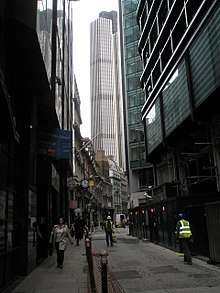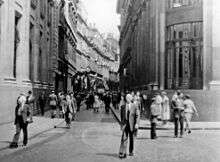Throgmorton Street
Throgmorton Street is a minor road in the City of London between Lothbury in the west and Old Broad Street to the east.
 | |
| Location | London, United Kingdom |
|---|---|
| Postal code | EC2 |
| Nearest train station | |
| Coordinates | 51.51483°N 0.08674°W |
| East end | Old Broad Street |
| West end | Lothbury |
History

It is named after Nicholas Throckmorton,[1] chief banker of England during the reign of Queen Elizabeth I and the head of an ancient Warwickshire family.
The London Stock Exchange formerly occupied the southern side of Throgmorton Street. It was also once the home of Thomas Cromwell, King Henry VIII's chief minister.
Throgmorton Avenue runs from Throgmorton Street to London Wall: it is a private road belonging to the Drapers' livery company and Carpenters' livery company with gates at each end. The gates to London Wall are controlled by the Carpenters' Company and are open between about 7 am and 7 pm on working weekdays. The livery halls of both companies can be accessed from the avenue, as can Drapers' Gardens; the Drapers occasionally use their hall's grander entrance on Throgmorton Street.
Transport
The nearest London Underground station is Bank, which can be reached via Princes Street, a short distance to the south from Throgmorton Street's western end. The nearest mainline railway station is Liverpool Street.
See also
References
- Throgmorton Street: The Drapers' Company. British History Online. Retrieved 5 May 2017.